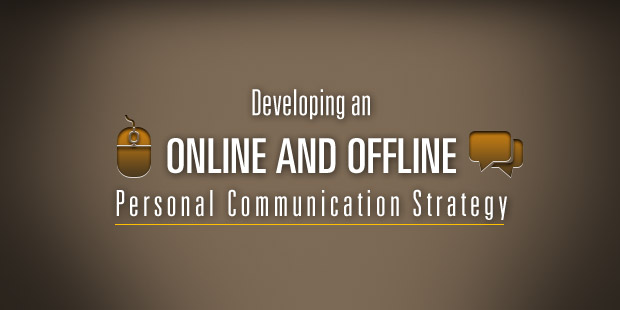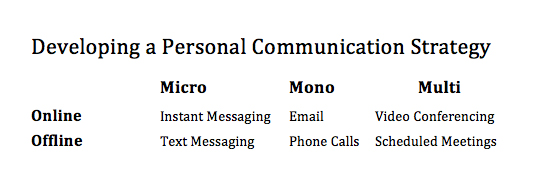
Developing an Online and Offline Personal Communication Strategy
I’ve been in a situation in life here lately where it has been necessary to develop a communication strategy online and offline. In the past, I have not given much thought to how I communicate with other people. Now leading a resourcing network for church planting, a missions collective for Haiti, and pastoring a church–I have come to really appreciate effective and thoughtful communication. Here’s basically what I’m learning to do.
There are three levels of communication I have with people on a regular basis. The first level is the micro level. That’s the daily chatter and conversation about details, requests, etc. Typically, this level of communication does not need to be recorded or archived. Rather, it is communication for quick and immediate response in the rhythm of the workday. The second level is the mono level. That’s the one-on-one communication about actionable matters of various levels of significance. Typically, this kind of correspondence has requests that need to be filled, questions to be answered, plans to be executed, etc., and therefore archiving and retrieving such correspondence is helpful if not necessary. The third level is the multi level. That’s the communication with multiple people in the collaboration process. On this level, you are taking in feedback and interaction from several sources at one time in one setting.
These three levels are worked out through different platforms/formats whether offline and online.
For offline communication on a micro level, I rely on text messaging. At this level, communication does not warrant a phone call or lengthy communication. It is intended for immediate feedback. On a mono level offline, I rely on telephone calls. The difference between the two levels are significant, because if something requires a phone call to be addressed is attempted to be covered via text, a lot of time is wasted in the process. However, if you care constantly calling someone about something that can be addressed over a text, that can create a frustrating work experience. You have to make judgments between the two and have operating agreements with your team. On the multi level offline, there’s scheduled meetings. These are structured times of collaborating with multiple people with a set agenda (talking points).
For online communication on a micro level, I rely on instant messaging (via Gmail) and direct messaging (via Twitter). I almost always have at least 2-3 IM tabs at the bottom of my Gmail with ongoing chatter about little matters that need immediate attention (changes, scheduling, updates, etc.). My online mono level is email. Again, like offline communication, this can be problematic. I don’t want a cluttered up inbox of emails that could have been instant messages or group emails that so often are strung around with the infamous “reply all” option on matters I’m often tangentially involved in. Emails can be a horrible medium for collaborative communication, which leads to the multi level online, namely video conferencing. If I am meeting with more than one person online, then I use Skype, Google Hangout, ooVoo, or GoToMeeting to forward projects, plan events/trips, discuss initiatives, etc.
For some time, I had been operating like this without fully recognizing it. Now that I see it, it has become all the more clear in learning to communicate better using formats/platforms appropriate to the level of correspondence. In my case, I work in a highly decentralized environment where online communication is 65% and offline communication is 35%. It may be the opposite (or some other breakdown) for you. Either way, know where you communicate most often and how you proceed to do so in the future may prove very beneficial down the road.
Have you developed a communication strategy for online or offline? What have you found that works best for you and those you work with?
Read more from Timmy here.

Tags: Awareness, Meetings, Social Media, Timmy Brister












